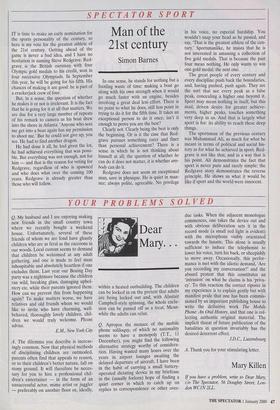SPECTATOR SPORT
Man of the 21st century
Simon Barnes
IT is time to make an early nomination for the sports personality of the century, so here is my vote for the greatest athlete of the 21st century. Getting ahead of the game is never a bad idea, and I have no hesitation in naming Steve Redgrave. Red- grave is the British oarsman with four Olympic gold medals to his credit, won in four successive Olympiads. In September this year, he will be going for his fifth. His chances of making it are good: he is part of a crackerjack crew of four. But, in a sense, the question of whether he makes it or not is irrelevant. It is the fact that he is going for it at all that matters. We are due for a very large number of repeats of his remark to camera as his boat drew into the shore in Atlanta: 'Anyone who sees me get into a boat again has my permission to shoot me.' But he could not give up, you see. He had to find another dragon.
He had done it all, he had given the lot, he had achieved everything that was possi- ble. But everything was not enough, not for him — and that is the reason for voting for Redgrave, regardless of who is spawned and who does what over the coming 100 years. Redgrave is already greater than those who will follow. In one sense, he stands for nothing but a footling waste of time: making a boat go along with his own strength when it would go much faster with an engine, besides involving a great deal less effort. There is no point to what he does, still less point in trying to do it for the fifth time. It takes an exceptional person to do it once; isn't it enough to prove you are the best? Clearly not. Clearly being the best is only the beginning. Or is it the case that Red- grave pursues something rarer and finer than personal achievement? There is a sense in which he is not thinking about himself at all; the question of whether he can do it does not matter, it is whether any- body can do it.
Redgrave does not seem an exceptional man, save in physique. He is quiet in man- ner; always polite, agreeable. No privilege in his voice, no especial hardship. You wouldn't snap your head as he passed, and say, 'That is the greatest athlete of the cen- tury.' Sportsmanlike, he insists that he is not interested in amassing a collection of five gold medals. That is because the past four mean nothing. He only wants to win one gold medal: the next one.
The great people of every century and every discipline push back the boundaries, and, having pushed, push again. They are the sort that see every peak as a false peak, concealing a higher one beyond it. Sport may mean nothing in itself, but this mad, driven desire for greater achieve- ments, higher peaks, touches something very deep in us. And that is largely what sport is for: its ability to reach these deep things.
The sportsman of the previous century was Muhammad Ali, as much for what he meant in terms of political and social his- tory as for what he achieved in sport. Red- grave is not like that, and in a way that is his point. Ali demonstrates the fact that sport is never pure and rarely simple; the Redgrave story demonstrates the reverse principle. He shows us what it would be like if sport and the world were innocent.


















































 Previous page
Previous page